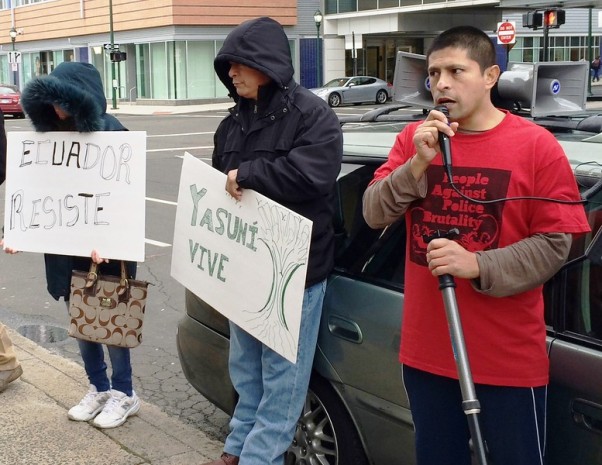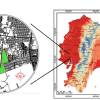Ecuador Internacional
Activists in New Haven demand end to Ecuadorian oil drilling
New Haven Register 18/12/2014

(Wes Duplantier -- New Haven Register) Luiz Ramirez, of Fair Haven, speaks to a crowd of demonstrators in front of the Ecuadorian consulate Wednesday in New Haven. Ramirez and about a dozen others were protesting the Ecuadorian government’s treatment of environmental activists. They say the government has also killed activists in Ecuador who oppose the government’s ...
They stood in a small group at the base of the towering Ecuadorian consulate building on Church Street, but as the afternoon clouds and cold set in, the chants of about a dozen people Wednesday only seemed to get louder.
“La patria no se vende! La patria no se vende!” they yelled, which translates in English to: our homeland is not for sale.
Nearly 3,000 miles from Ecuador, the group of immigrants and activists outlined their opposition to oil drilling in that country’s most diverse lands, its alleged heavy-handed treatment of environmental activists and alleged role in the deaths of some who oppose its policies.
The Ecuadorian government has impounded a biodiesel bus, known as Chebus, which environmental activists had been driving from northern Mexico to a United Nations climate summit in Peru known as COP20, which ran Dec. 1-12.
The bus had successfully passed through several Latin American countries since it began its journey this summer, but the caravan reportedly encountered harassment from Ecuadorian authorities because it partnered with YASunidos, a group opposed to commercial petroleum extraction in Yasuní National Park, a policy propelled by Ecuadorian President Rafael Correa.
The government seized the bus on Dec. 2, charging its driver, activist Christian Guerrero, with “commercially operating” the bus without a permit. Guerrero faces up to three years in prison and $5,000 in fines.
Those at Wednesday’s protest in New Haven repeated the movement’s demands that charges against Guerrero be dropped, that the Chebus be safely returned with an apology and that Correa end oil extraction in Yasuní.
Luiz Ramirez, an Ecuadorian native who now lives in Fair Haven, said he also wants to draw attention to the recent death of José Tendetza, an Ecuadorian activist who was opposed to a mining project there. The Guardian newspaper reports that Tendetza’s body was found tied up and buried, days before he also planned to criticize the Ecuadorian government in Peru.
“As an Ecuadorian, I lived in this part of the country and I feel the pain because what the government is doing is not right,” he said.
About halfway through the protest, a man protestors identified as Raúl Erazo Velarde, the consul general of Ecuador in New Haven, approached the group and appeared to be taking pictures or video of demonstrators.
The protestors began yelling louder and waving their signs. Ramirez jumped in front of the camera and spread his arms wide. .
Erazo Velarde said nothing to the protesters.
When approached by a Register reporter, he began talking on the phone and told the reporter to wait outside but he did not come back out to answer questions.
Multiple phone numbers listed for the New Haven consulate were not answered when a reporter tried to reach Erazo Velarde by phone Wednesday.
In addition to the environmental issues in Ecuador, some of the demonstrators had complaints about the consulate on Church Street. Wilmer Barzallo, with the United Front of Ecuadorian Immigrants, alleged the consul is a “waste of resources” and a bureaucracy that doesn’t effectively help Ecuadorians in the area.
“This place doesn’t give any services to the community,” he said.
After the protest, Zuniga said many of the people protesting on this issue are not anti-government or even against all of Correa’s policies. The group said he has been an advocate for free speech and progressivism, pointing to Ecuador’s decision to house Wikileaks activist Julian Assange at the country’s embassy in London.
But Zuniga, an East Haven carpenter who came to the United States from Ecuador in 1989, said he and others deeply oppose the exploitation of Ecuador’s environment and stifling of dissent within the country.
“I know the land like the palm of my hand,” Zuniga said. “I know them, I know their government, I’ve voted for them. But injustice doesn’t pass anything. My principals, my morals stand. Whatever economic situation they have in Ecuador, it’s not justified what they’re doing in order to just get richer and richer.”
As they finished their protest about an hour after it began, the group encouraged people to get involved and vowed to return and to keep making their arguments against drilling and exploitation of their native country’s natural resources until their message is heard.
“We will be back!” They yelled toward the consulate. “We will be stronger! We will not take it any longer!”
Fuente OriginalNotas relacionadas
-
 Outspoken Ecuadorian Tribe Vows to Bring the Fight to China's Amazon Oil Exploration
Outspoken Ecuadorian Tribe Vows to Bring the Fight to China's Amazon Oil Exploration -
 Steven Donziger’s Pathetic Attempt To Avoid Disbarment In DC
Steven Donziger’s Pathetic Attempt To Avoid Disbarment In DC -
 Estudio del confort térmico en viviendas sociales de Ecuador
Estudio del confort térmico en viviendas sociales de Ecuador -
 GIZ y BGR lanzan concurso de innovación tecnológica para la minería en Latinoamérica dirigido a estudiantes Universitarios
GIZ y BGR lanzan concurso de innovación tecnológica para la minería en Latinoamérica dirigido a estudiantes Universitarios -
 Fiscalía cita a María Paula Romo y César Litardo por el caso de Mendoza y Azuero; Ministra reacciona
Fiscalía cita a María Paula Romo y César Litardo por el caso de Mendoza y Azuero; Ministra reacciona -
 'No pedimos caridad, solo que nos paguen el sueldo de junio': Fernando Galeano, profesor fiscal
'No pedimos caridad, solo que nos paguen el sueldo de junio': Fernando Galeano, profesor fiscal
